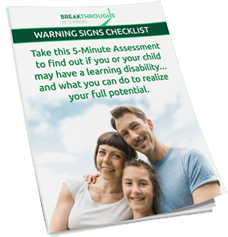
Does it affect life at home, at school or at work?
Take 5 minutes to complete the Warning Signs Checklist and discover whether you or your child could have learning difficulties that are impacting your life, and what to do about it.
Take The Free Warning Signs Checklist!
“They’ll grow out of it.” This is what parents often hear as issues arise during child rearing. Some behaviours can work themselves out as a child matures, but a learning disability is not merely a behaviour. It is a serious issue that compromises both learning and quality of life.
At Breakthroughs in Learning, 20% of the people we help are adults who still struggle with their learning disabilities. Learning disorders do not just go away with age or maturity. If anything, they may become worse and severely limit future success and functioning.
Fortunately, learning disabilities do not hide and signs are often showing even before a child starts school. By moving beyond just hope and into action, a child can not only do better at school but also experience more success and quality of life in adulthood.
All children have their quirks but when a quirk becomes disruptive to development and education, it can be a warning sign of a learning disability or a condition that hinders learning, like ADHD. Either way, early intervention can keep the disability from becoming a larger problem later.
Taking a look at the Warning Signs Checklist, learning disabilities start with base symptoms that are built upon as the child becomes older. Warning signs for children in preschool and junior kindergarten include poor coordination, lack of interest in writing and coloring, limited language skills and difficulty rhyming or remembering letters, just to name a few examples from the checklist.
As the child becomes older, another set of challenges will pile upon the previous issues. In addition to those symptoms in preschool and junior kindergarten, the child may also have difficulty associating sounds with letters, following instructions, and remembering words. If there is still no intervention, the signs will continue to escalate as the child advances up the grades. More memory problems emerge along with difficulty reading. There may also be “acting out” behavior as the child’s self esteem is affected by their school struggles. Many children eventually develop behavioural issues from facing years of daily struggle in school.
This escalation process is why early intervention is always the best outcome. If the signs are not recognized until later in the child’s life, then quick action becomes the best outcome.
Most parents are not equipped to solve a learning disability on their own. Learning disorders need to be addressed by professionals. Educational therapy, where the child learns to strengthen those areas which are weak, has proven very beneficial. As a first step, an assessment reveals the foundational learning skills that are underdeveloped. After results are reviewed, the therapist can develop a program of cognitive exercises and goals to help the child overcome the shortcomings they are struggling with, and put it behind them.
If a parent suspects a learning disability, the Warning Signs Checklist will help make a preliminary determination. While the checklist is not comprehensive and not a diagnosis, it is a good start when determining a child’s learning issues.
The checklist is also good at showing how learning disabilities will only intensify learning difficulties as the child gets older. It is a progressive list showing the evolution of learning barriers. Hope alone will not prevent the escalation and waiting for it to disappear only continues frustration and struggle.
Hope, working along with help, will change a child’s learning patterns and stop the escalation of negative outcomes and behaviours. If the checklist reveals possible issues, please contact Breakthroughs and take advantage of a free consultation.
Subscribe to our newsletter and receive regular articles and resources to help you or your child perform better at school, home or work.
suscribe now
Post Your Comment Below